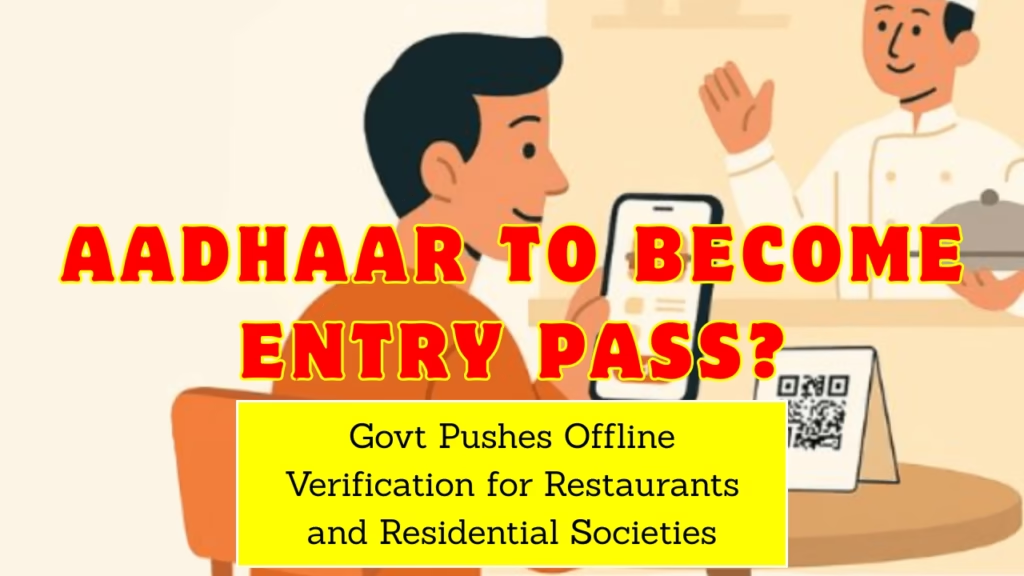New Offline Aadhaar Verification System In India: Aadhaar May Soon Be Mandatory for Restaurants & Housing Societies: India is also ready to implement offline Aadhaar verification, which will allow you to enter your identity in such places as hotels, restaurants, and building entrances with the help of QR codes and face recognition. Check out the role of this new system, and what it will do to your privacy in 2025.
Just think about going to a restaurant or a gated community that does not require anyone to provide them with a physical ID card or photocopy. Instead, you simply have to scan a quick QR code or scan your face and your identity is checked immediately. This is where India is heading to in future with a new offline Aadhaar system that the government is planning to develop in the year 2025. It will make places accessible to everyday people easier, safer, and more private, however, it will not do it without raising concerns regarding the safety of personal information.
Government Offline Aadhaar Expansion: Entry to Restaurants, Housing Societies
The biometric agency of the government UIDAI which runs Aadhaar states that this new offline process of verification will eliminate the necessity of presenting or distributing physical copy of your Aadhaar card. Rather, it will be based on digital QR codes and face recognition that does not require an active internet connection and has no extraneous charging. Here, you might be able to check in by just scanning a QR code or standing in front of a scanner and your face would be compared locally and not to the UIDAI servers.
The innovation is bound to be applied in numerous practical scenarios. In the not too distant future, you may have to prove who you are when you check into a hotel, unlock the door of a residential building, unlock a door to an office or computer center, or even when you are taking an exam.
There are also other applications such as finding cab drivers or delivery personnel, verifying your age to purchase certain restricted goods such as cigarettes and going to concerts or sporting events. Imagine that it is a digital ID that takes place in a flash-fast and unobtrusive manner in the background, simplifying daily living.
Offline Aadhaar Verification – How it Works?
Prior to launch, UIDAI convened a meeting with approximately 250 major stakeholders – hotel owners, residential society managers, event organizers, etc. – and told them how the new system would operate. They emphasized that this offline authentication will be privacy friendly and secure, and people should not supply anyone with the physical or photocopy copies of Aadhaar as it may be abused or forged. Rather, the new approach is aimed at preventing fraud and enhancing more credible verification.
So, how will it work exactly? At the moment the specifics remain scanty, but the authorities confirmed that it will be based on QR codes and a face recognition system that operates fully offline. The face scan will be used as a form of presence, which will prove the identity of a person without necessarily having to connect to the central UIDAI database every time. This is contrary to the face authentication that is currently applied by the banks, which involves access to the internet.
Aadhaar to Become Entry Pass?
Redesigned Aadhaar app whose pre-launch test is already underway will have the new Aadhaar verification incorporated into it. Once it becomes official, the system will enable businesses and organizations to become approved as an Offline Verification Seeking Entity, i.e., after the company becomes certified, it can use the application to check on customers or visitors safely. This will involve certain rules on data sharing and data security, and a minor fee will be imposed onboarding.
After the app becomes operational, you would be able to scan a QR code shown at the door to confirm your identity or scan the face to be allowed in. This will accelerate operations in various locations such as hotels, office buildings, hospitals, airports as well as events. The government claims that it is committed to ensuring that the process of verification is easy, quick, and privacy-conscious, keeping your personal information safe and getting the convenience of the digital ID-check anywhere.
Offline Aadhaar Verification Regulations
The government is also trying to formalize offline Aadhaar verification regulations so that the organizations can be aware of how to deal with data and preserve privacy. Any business or other organization registered by law in India can apply online to be an authorized verifier. They will have to show registration, security checks and be connected with the Aadhaar to create QR codes to their consumers.
New Offline Aadhaar Verification System In India
All in all, the new offline Aadhaar verification system in India will significantly simplify the daily activities. It will not be too far before you no longer have to carry or present any physical ID cards, and your face or QR code will perform the task in a few seconds.
Although this new way makes it more convenient, it also emphasizes the significance of powerful privacy regulations. Since the system is nearing completion and is available in the near future, India is entering into a new era where verification is not only smooth and secure but also private, which means that daily routines are much faster and easier to everyone in 2025.

